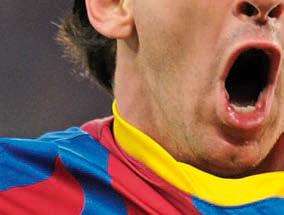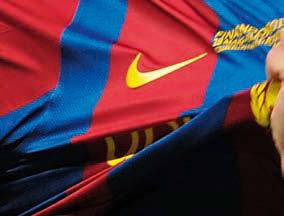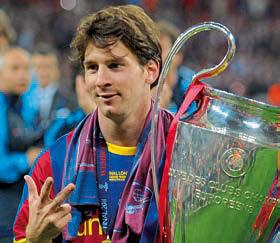
7 minute read
Lionel Messi 2011

Lionel M ESSI MESSI


Regaining the crown…the 2009 winner tops the 2011 poll
Re Recordcordbreaking breaking enigma enigma
Lionel Messi is the ionel Messi is the overwhelming choice helming choice as Wo Wor l r ld Soccer’d Soccer’s s World rld Pl Player of theayer of the Year. The brilliant Barcelona ar. The brilliant Barcelona and Argentina ace collectedand Argentina ace collected more than 60 per cent of the more than 60 per cent of the vo vote tes cast in our annual poll s cast in our annual poll – an all-time record. – an all-time record.
It is the second time Messi hasIt is the second time Messi has topped the Wor ld Soccer poll. He was the victor in 2009, but lost out to his Barca team-mate Xavi last year. Xavi finished third this time, behind Cristiano Ronaldo of Real Madrid and Portugal.
There were three Barca players in the top ten – Messi, Xavi and Andres Iniesta – while five of the top ten play in La Liga.
Brazilian starlet Neymar is the only player in the top ten based outside of Europe. The Santos youngster finished sixth in the World Player poll, but won the Young Player award ahead of Borussia Dortmund’s Mario Gotze.
Barcelona cleaned up, winning the Team award and coach Pep Guardiola chosen as Manager of the Year. But it is Messi once again who take the plaudits.
At the age of just 24 he has amassed an astonishing CV, with the standout moments from an impressive list of individual and collective honours being the five La Liga-winning sides he has
2 011



been part of and the two Champions League final victories he played in.
So, as he is crowned World Player of the Year again, just what else does Messi have left to achieve?
Well, in his homeland not everyone is fully convinced yet, and they point to a glaring gap in that impressive list of honours. They believe that Messi has still to deliver for his country.
“Messi is the best player in the world,” said Argentina coach Alejandro Sabella recently. “He plays extraordinarily well for Barcelona, so then when he plays just well for Argentina it seems like he is underperforming.”
The most tangible, and indeed most impressive, aspect of Messi’s game is, of course, his scoring record. Since Frank Rijkaard handed him his Barca debut in 2004, his strike rate has continued to improve every year, culminating with a staggering 53 goals in 55 matches by the end of the 2010-11 season.
In the current campaign he averages better than a goal every game and may well reach Cesar Rodriguez’s club record of 235 goals by the end of this term. Factoring in an assist for every two goals that he scores, his form is nothing short of sensational. But the contrast between his displays for Argentina and those for
Messi magic… celebrating his goal in the 2011 Champions League final



Barcelona is stark. For example, his overall strike rate at club level is 0.71; for Argentina, with 19 goals from 66 games, that rate drops to 0.28.
More nationalist sectors of fans and the media in Argentina have questioned his commitment to the national side, suggesting he feels more Spanish than Argentinian, having emigrated at such an early age. His debt to Barcelona is evident as the club paid for the medical treatment he needed as a teenager when both Newell’s Old Boys and River Plate refused. But instead of displaying little interest in turning out for his country, if anything Messi often appears to try too hard, attempting to resolve situations alone. There are also broader issues that shed light on why his performance levels differ with Barca and Argentina.
One comparison is the quality of the squad that surrounds him. The current Barcelona team is widely considered to be one of the greatest club sides of all time. In the 55-player shortlist for their World XI, FIFPro included an entire Barcelona starting XI, with Victor Valdes, Dani Alves, Carles Puyol, Gerard Pique, Eric Abidal, Andres Iniesta, Xavi, Sergio
Busquets, Cesc Fabregas and David Villa lining up alongside Messi.
Representing Argentina, along with Leo, was Manchester City ’s Sergio Aguero.
The shortlist for the FIFA Ballon d’Or offered a similar trend, with seven Barca players put forward with Messi, and again only himself and Aguero flying the flag for Argentina.
These nominations lend weight to the views held in Argentina that the country is not producing the same number of first-class players as it once did.
Individual brilliance, however, is only part of the story. Edinson Cavani and Luis Suarez were the only Uruguayans in the FIFPro list, but Uruguay are the top side in South America right now, and indeed one of the best in the world, with Oscar Tabarez having developed a finely-tuned team. When asked about this year’s Copa America triumph, Tabarez said he had simply copied Jose Pekerman’s blueprint for developing the youth-team players.
Pekerman was one of Messi’s early mentors. Having produced spectacular results with the Argentina Under-20s, he took over the national team in 2004 and a year later handed Messi his full debut.
Pekerman soon left, however, and since then Messi has worked under Alfio Basile, Diego Maradona, Sergio Batista and now Sabella. From Basile’s devotion to playing with a classic enganche (playmaker), to Maradona’s back line of four central defenders, to Batista’s aim to replicate the Barcelona system – but not push his full-backs past the halfway line – there has neither been continuity in the personnel nor the approach.
This contrasts with Barca, where Messi has played for just two first-team coaches: Rijkaard and Guardiola. As an institution, Barca have maintained a coherent policy in the youth system for decades – one which is now paying huge dividends.
Despite the merry-go-round of Argentina coaches, Messi soon became the central creative force for Argentina, especially after Juan Roman Riquelme quit the national team. Yet in taking on greater responsibility for the team, his goalscoring suffered. Ironically, the player said to be Maradona’s natural heir produced his worst return under Maradona the coach, with just three goals in 16 appearances.
In the aftermath of the Copa America embarrassment, Sabella was handed the task of swiftly turning around the results, and focusing on building a team for the 2014 World Cup. One of his first decisions was to change his captain, and in turn award Messi with another honour this year: making him skipper.
As Sabella himself has admitted, Messi is far from being the tub-thumping caudillo, the charismatic leader, but he expects him to lead by example.
“Messi is the key player,” he says. “Whenever he has the ball you expect something to happen.”
It is this expectancy that grows with every dip of the shoulder, every dribble, every geometrically perfect pass and every hat-trick.
At the age of just 24 he has amassed an astonishing CV…so, as he is crowned World Player of the Year again, just what else does Messi have left to achieve?



Top 10 Players of 2011
Player Club
Country % of vote 1) Lionel Messi Barcelona Argentina 60.2 2) Cristiano Ronaldo Real Madrid Por tugal 9.3 3) Xavi Barcelona Spain 7.6 4) Luis Suarez Liverpool Uruguay 5.6 5) Andres Iniesta Barcelona Spain 2.6 6) Diego Forlan Atletico Madrid/Inter Uruguay 2.5 7) Neymar Santos Brazil 2.3 8) Radamel Falcao Por to/Atletico Madrid Colombia 2.2 9) Zlatan Ibrahimovic Milan Sweden 1.8 10) Robin van Persie Arsenal Netherlands 1.6

The top three…(left to right) Cristiano Ronaldo, Xavi and Lionel Messi
Other World Soccer Award winners 2011
Perfect Pep… Guardiola pipped Uruguay’s Oscar Tabarez by just 1.7 per cent
MANAGER OF THE YEAR: Pep Guardiola, Barcelona TEAM OF THE YEAR: Barcelona
Young gun… Neymar registered 29.3 per cent of the vote
YOUNG PLAYER OF THE YEAR: Neymar, Santos & Brazil










